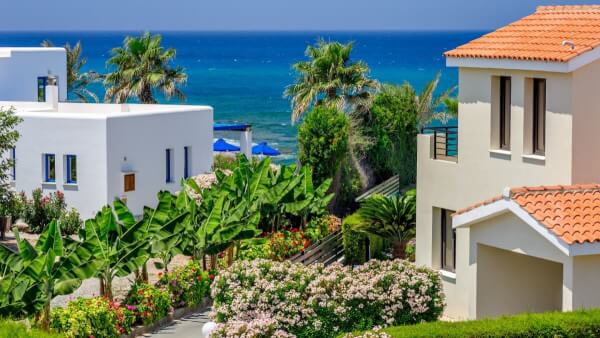How to move to Greece from Canada
Read on to get an idea of the healthcare system, visa requirements and other essentials, including a Euro account that Wise can help you get in a few clicks

The idea of moving to Costa Rica is an attractive one for many people. This is one of the most stable and welcoming countries in Central America, with stunning beaches and superbly preserved rainforests.
Whether you’re looking at buying property in the capital of San José, or in one of the other cities such as Liberia, Alajuela, or Heredia, there’s plenty of real estate waiting for you to buy.
In this article, we’ll tell you the key things you need to know before investing in Costa Rican property, ranging from any special rules for foreigners to the main taxes and charges you’re likely to encounter.
Before you read on, a word.
Sending money internationally with your bank can be costly.
Wise is different. Its smart new technology skips hefty international transfer fees by connecting local bank accounts all around the world. Which means you can save quite a bit of money by using Wise rather than your bank when you send your money abroad.
Check out how to make your first transfer with Wise. And give it a try.
Oh, and while you’re at it, check out Wise’s free borderless multi-currency account. Where you can manage and send dozens of currencies all from the same account.
Now, back to what you came here to read.
Costa Rica’s economy has suffered in recent years, and political problems in neighbouring Venezuela and Nicaragua have also scared off some buyers even though Costa Rica itself has remained a stable country. The real estate market has been hit as a result, although top-end properties are still in strong demand.¹
Buyers from the US make up a majority of the buyers of luxury homes, and US dollar exchange rates against the Costa Rican colon have also been favourable. Even so, prices remain significantly lower than at the top of the market a decade ago.
The real estate market in Costa Rica is dominated by the capital, San José. With a population of over 300,000, it’s around six times larger than any other city in the country. That means it has the widest range of properties available and so average prices can disguise a lot of variation compared with anywhere else.
As a guide, we’ve put together a list of the average prices per square metre for buying apartments, both inside and out of some of the main city centres. The information is gathered from numbeo.com. We’ve also included what it’ll cost you each month to rent one-bedroom and three-bedroom apartments in these major cities. We’ve given prices in Costa Rican colons (CRC).
| Purchase - price per square meter |
|
|---|---|
| Rental - rent per month |
|
| Purchase - price per square meter |
|
|---|---|
| Rental - rent per month |
|
| Purchase - price per square meter |
|
|---|---|
| Rental - rent per month |
|
| Purchase - price per square meter |
|
|---|---|
| Rental - rent per month |
|

The good news here is that there aren’t many restrictions on Canadians who want to own Costa Rican property. In most of the country, you can buy real estate with the same rights as locals, and you generally won’t need to have a local partner. It’s common to set up a corporation to purchase, though, since this can give tax advantages and make transferring the property easier.⁶ ⁷
There is one major exception to the relaxed rules on foreign ownership, and this applies if you’re looking at beachfront property. In what’s known as the Maritime Zone. Anywhere in the first 200 metres from the high tide line, you’ll only be allowed majority ownership if you’ve lived in Costa Rica for five years.
It’s also worth knowing that the first 50 metres from the high tide line is known as the Public Area — and that means what it says. If you’re looking for a totally private beach, then you’re out of luck, as there’s no such thing in Costa Rica.⁷
The vast majority of property in Costa Rica is titled, in other words already listed as having a registered owner. While it’s not illegal to buy untitled property, it’s generally a really bad idea. That’s because you can end up entangled in legal arguments about who actually owns the real estate in question — and these arguments can sometimes drag on for years.⁸
It’s critically important to take care when finding a real estate broker in Costa Rica. That’s because there’s no requirement for them to be licensed — so pretty much anyone can set themselves up as a broker. The best thing to do is to look for an agent who’s a member of a recognized real estate association, such as the popular CRGAR organization.⁸
Another reason it’s important to get the right broker is that they can really help with finding a Costa Rican real estate attorney. Don’t skimp on this, as there’s quite a bit of documentation to deal with, ranging from dealing with any back taxes to drawing up a due diligence report. You’ll also need to get all deeds lodged with the Public Registrar, though you don’t need to be physically present in Costa Rica for this.⁸
One reason Costa Rica attracts many buyers from North America is its very low property tax rates. In fact, they’re a mere 0.25% per year.⁹ In other words, if you purchase a property that’s assessed as worth $300,000, you’ll pay just $750 in taxes annually.
Once you’ve agreed terms with the seller, you’ll need to settle closing fees. Who pays what can vary, but usually you’ll pay half and the seller the other half. Fees usually come to between 3.5% and 4% of the purchase price, with about two-thirds coming from transfer taxes and the rest going in legal fees.¹⁰
Another big cost you’ll need to be ready for is the deposit on the property. Once you’ve signed a contract with the seller, you’ll be expected to pay a deposit of around 10% within two weeks. It’s usual for these funds to be held in an escrow account.⁹
Bear in mind that most charges can vary a lot, since Costa Rica’s property market is largely unregulated. This makes it vital to compare your options carefully when choosing a real estate agent.
Exchange rates can also affect your total bill, but in general you can calculate them based on the mid-market rate. As well as conventional banks, you may also want to look into alternative providers such as Wise for international transactions.
Disclaimer: Nothing in this guide should be taken as tax advice. Information is provided for general advice only. For tax advice, please consult a qualified professional.
Taking a little time to get prepared and consider your options can be well worth it in the long run. It’s likely to make your task a whole lot easier and it’ll make it simpler for you to find the property you’ve always dreamed of owning. Then, you can relax in the knowledge that you’re ready to start your adventure in the Costa Rican sun!
Sources:
*Please see terms of use and product availability for your region or visit Wise fees and pricing for the most up to date pricing and fee information.
This publication is provided for general information purposes and does not constitute legal, tax or other professional advice from Wise Payments Limited or its subsidiaries and its affiliates, and it is not intended as a substitute for obtaining advice from a financial advisor or any other professional.
We make no representations, warranties or guarantees, whether expressed or implied, that the content in the publication is accurate, complete or up to date.

Read on to get an idea of the healthcare system, visa requirements and other essentials, including a Euro account that Wise can help you get in a few clicks

Read on to understand the important things to take care of and to note before you move from Canada to Singapore. This also includes a Wise SGD account

Read on to find tips on visas, settling in, and how Wise can simplify managing your money abroad

Read on to understand the things to take care of and note before moving from Belize to Canada. This includes a Wise account for your foreign currency usage

Read on to explore the investor visas available in the US for Canadians, along with how Wise can ease the cross currency transactions you would need to make

Planning a move from Canada to the UAE? Here’s a complete guide on everything you need to know, from preparation and paperwork to settling in.